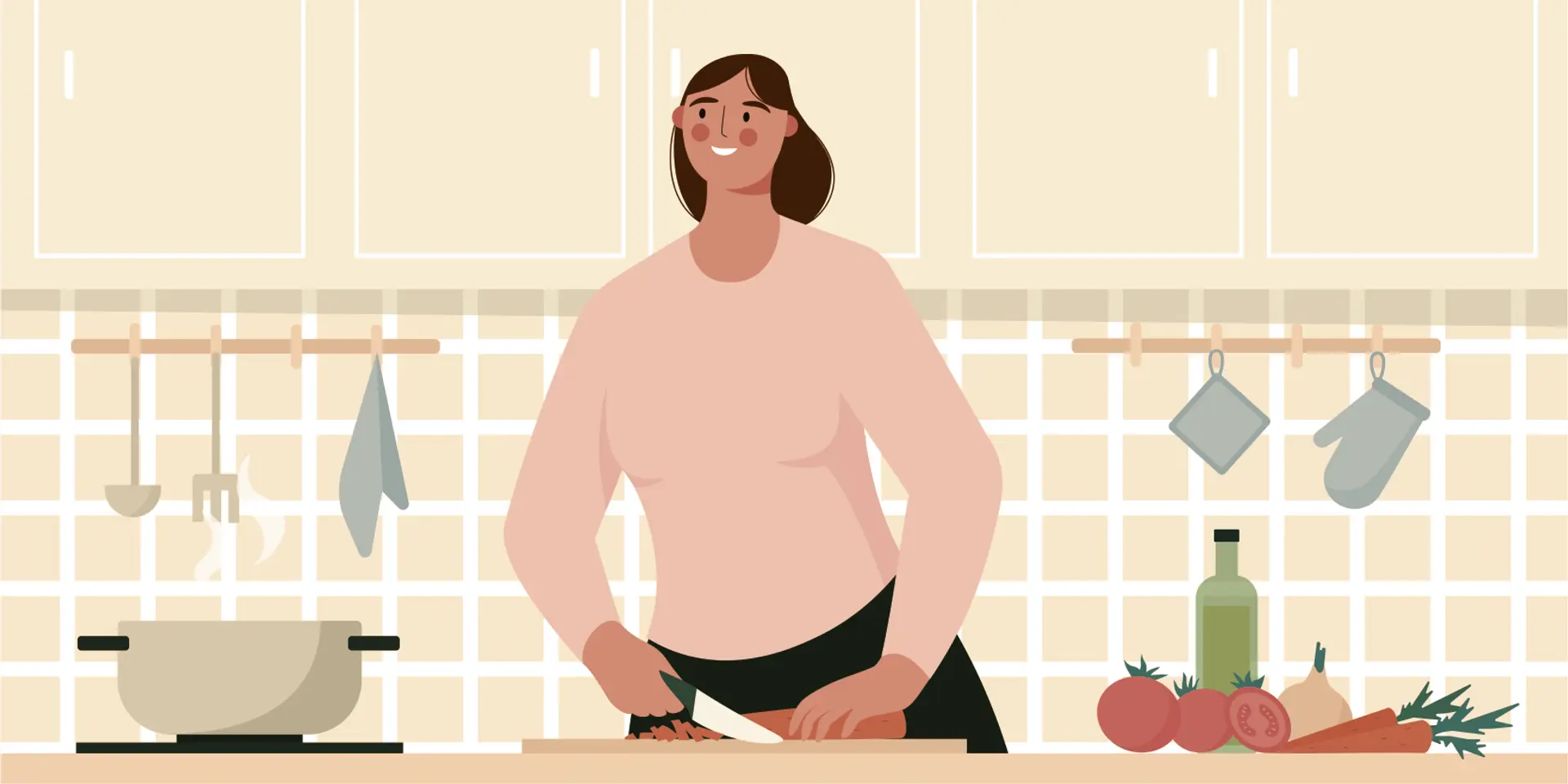Home chefs cash in as foodies across India acquire a taste for homecooked food amidst pandemic
The coronavirus pandemic has made foodies wary of eating out and ordering in from restaurants. As safety trumps all other considerations, home chefs in metros and small cities have clambered on to the gravy train to start and grow their businesses.
Dining in is the new dining out.
With the coronavirus pandemic upending almost everyone’s plans to eat out, a new saviour has emerged: the home chef.
A rising number of home chefs, largely women, have taken the food delivery industry in India by storm. From an intrepid 16-year-old baker to a middle-aged homemaker looking to supplement her family income, food delivery from home has never been so lucrative or innovative.
The closure of restaurants amidst the lockdown pushed a majority of people to start cooking at home. But months later, cooking fatigue set in and food lovers began looking for a way out. The safety factor still keeps most of us away from restaurants and cafes, which is why even five-star hotels have entered the food delivery business.
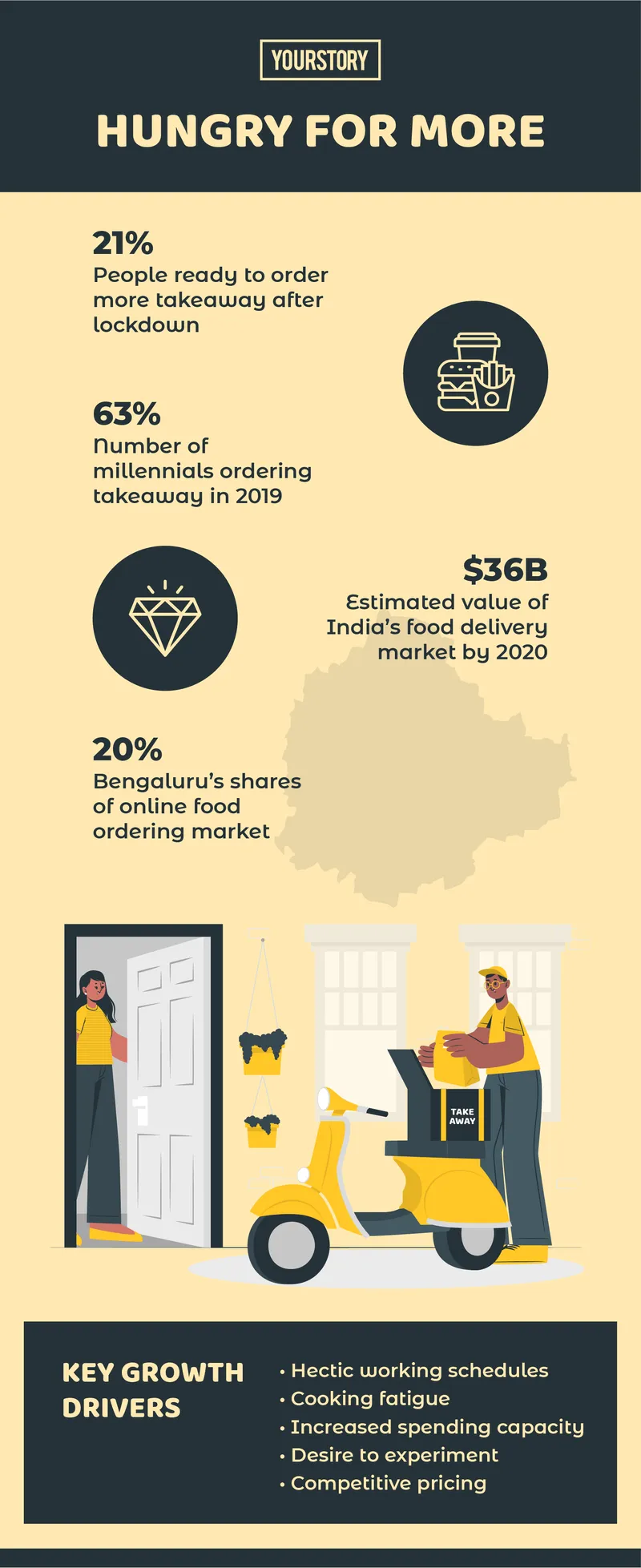
A rising number of home chefs, largely women, have taken the food delivery industry in India by storm.
Homebound and nowhere to go, people began ordering in with a vengeance. And a variety of home chefs surfaced to satiate cravings for all kinds of cuisines.
Sampradha Srikanth, a HR professional working from home during the pandemic, relies on a home chef in her gated Bengaluru community for lunch every day.
“With timelines and boundaries blurred during the pandemic, I mostly resort to ordering my lunch from a neighbour as I don’t find the time to cook. Since I know her personally, I am aware of her standards of quality and hygiene. The food is tasty too,” she says.
An analyst in the food industry says the home chef concept has been around for long, but scalability of the model was always in question.
“It is operationally intensive and needs multiple people. But with the lockdown opening up, the need to eat different kinds of food, and being careful, there may be a slow but steady rise towards home-cooked meals,” he says.
Several analyses support this.
According to a RedSeer report, the overall food delivery market in India was valued at $15 billion in 2016 and is projected to grow at a CAGR of 24 percent to reach $36 billion in 2020.
The pandemic may have eaten into these projections, but in a recent survey conducted by the company, 21 percent of respondents said they were more likely to increase their online ordering of takeaway food after the lockdown.
From Mumbai and Gurugram to Pune, Chennai, and Bengaluru, metro cities are now buzzing with the taste of home chefs using their culinary skills to run lucrative businesses.
These home chefs are being supported by dedicated platforms such as Noida-based and Mumbai- and Pune-based that are connecting them to prospective customers and helping them build a loyal customer base.
What makes these home chefs so popular? The taste of the food, affordability, the innovative way they use social media to promote their enterprise, or the fact that they promise “safety”?
HerStory looks at what’s cooking in these kitchens and how they are catering to an increasing number of people dining in.
India’s Silicon Valley wants a taste of home
Supriya R works with a media house on shifts that extend into the wee hours. A regular with online food delivery platforms, the 23-year-old shifted to home chefs amidst the pandemic as she works from home.
A number of other young people from Bengaluru, India’s Silicon Valley, are turning to home chefs for their daily dabbas, snacks, or occasional cravings.
Like a number of home food businesses, Julie’s Kitchen, run by Julie Kumar, accelerated its operations during the lockdown.
“We were serving a few friends in our apartment building for about six months prior to the lockdown and came up with the idea of delivering food to people in the vicinity as well,” Julie says.
Julie offers a pre-set menu, which includes the dal-roti-sabzi-salad staple apart from traditional Gujarati dhokla, theplas, chicken kebabs, chicken curry, chicken biryani, mutton biryani, and customised meals on request. Her most popular dish is laal maas, which is a huge hit with customers.
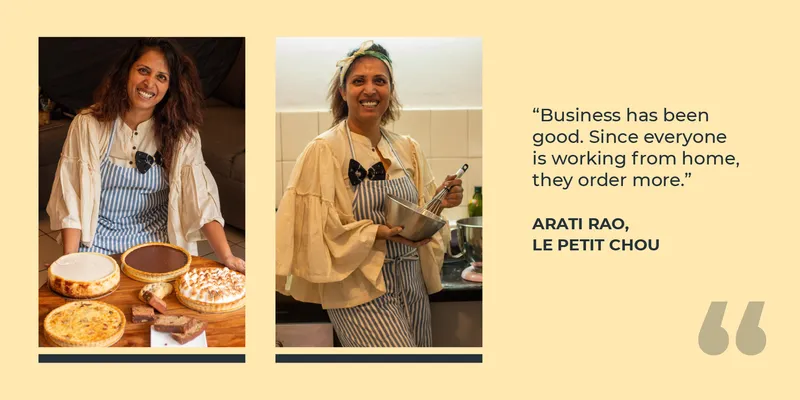
Arati Rao’s Le Petit Chou indulges the sweet tooth with tarts, eclairs, mousse, macarons, quiches, croissants, and more, in the price range of Rs 200-400 per person. “Business has been good. Since everyone is working from home, they order more,” she says.
Sowmya Srinath’s passion for cooking translated into a business with Dubaww. Like many others, she started the business at the onset of the pandemic and there’s been no looking back.
Her prices are very nominal, around Rs 100 for a meal. Her signature dishes are vethakuzhambu/parippu usuli, traditional recipes that repeat on the menu owing to their popularity.
Satiating diverse appetites in Aamchi Mumbai
Interestingly, Aishani Chowdhury’s The Dough & Batter, started on March 25, 2020, a day after the national lockdown.
She and her father, Sumit Chowdhury, decided to combine forces and make and sell breads and cakes to people in the neighbourhood, donate to those who were not getting food, and support Mumbai Police and doctors at the forefront of fighting the pandemic.
Aishani sells cupcakes, cinnamon raisin buns, sourdough breads, and items like babkas, challahs, and Korean cream cheese garlic buns. She comes up with a new item every week and advertises it on social media.
In the first month, the father-daughter duo delivered products themselves. They have now turned to professional courier services for delivery.
Mehroze Mukadam uses Authenticook, a platform for home chefs to hone their skills and showcase their culinary expertise. She specialises in Bohri food with signature dishes such as Malai Seekh Boti Biryani and Walnut Halwa.
Like most businesses, Mehroz faced a pinch during the lockdown but business has picked up as restrictions lift.
“Revenues have been up since the lockdown. In the last one month, I made Rs 20,000 through Authenticook delivery,” she says.
India on a plate
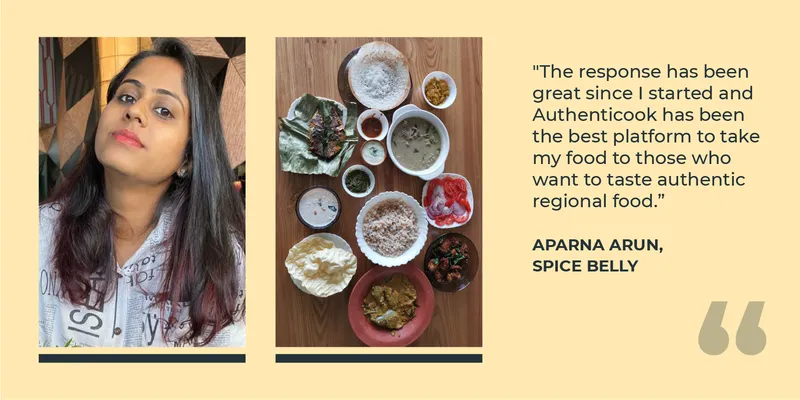
Pune-based Spice Belly is Aparna Arun’s ode to Kerala cuisine. She started her business during the pandemic as people started preferring home-cooked meals, taking into account the hygiene and nutritional factors. She also uses Authenticook for delivery of Kerala meals (Rs 60-400), Thalassery biryani, and Payyoli chicken fry. On an average, she takes 10 orders in a week.
“Everyone misses dining out and the next best thing is to order food home. The response has been great since I started and Authenticook has been the best platform for me to take my food those who want to taste authentic regional food,” she says.
In Gurugram, Abhilasha Jain started Marwadi Khana from her home kitchen in 2014 to showcase traditional Marwari food. Amidst the pandemic, she had to shut her business for almost three months to keep her team safe.
“A lot of people were tired of cooking at home and I began getting a lot of queries. So very cautiously, we started again. We are now seeing a large number of smaller orders. Many are opting for our full-week menu, a very simple home-cooked meal,” she explains.
The festival of Raksha Bandhan also saw a surge in sales for traditional Rajasthani sweets. Her food is available in the price range of Rs 300–3,000 per person.
Food for thought
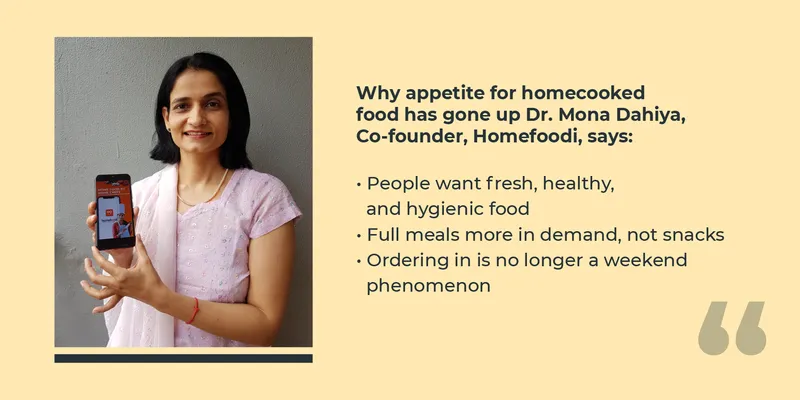
Homefoodi, co-founded by Dr Mona Dahiya, is a Noida-based ecommerce startup and claims to be India’s first mobile app for authentic homemade food made by home chefs.
Mona says three patterns have emerged in the food delivery business in the wake of the pandemic.
“People have become extremely conscious of what they eat. Most people now only trust fresh, healthy, and hygienic home-cooked food over that served by small restaurants and commercial cloud kitchens. Secondly, the average order value has gone up considerably as people have moved from quick snacks and bites to full meals. And finally, food orders have become a daily phenomenon as opposed to an earlier spike in weekend orders on account of the work-from-home culture,” Mona says.
The company has moved every dimension of its business online to ensure a complete contactless ecosystem of home chefs, vendors, delivery partners, and company employees.
A source within a leading on-demand delivery food platform says that the food delivery business, which was badly impacted due to the lockdown, has now seen a shift. “There is a 10 to 15 percent rise in orders for health food and homecooked meals. This is primarily because people are looking for fresh and hygienically cooked meals.”
And it doesn’t seem like the appetite for homecooked meals will be satiated anytime soon.
Rohan Agarwal, Director, RedSeer, says online food delivery was growing at 100 to 150 percent for the last four years, and COVID-19 “significantly impacted it”.
“But delivery will recover faster than dine-in simply due to the reduced touchpoints. Dine-in will take longer than April to May 2021,” Rohan says.
Clearly, India is hungry for more homecooked meals.
Edited by Teja Lele


